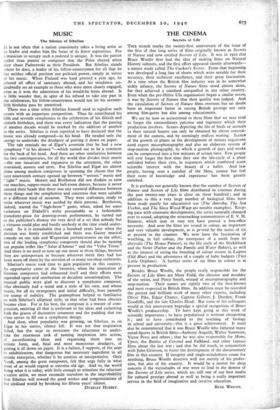THE CINEMA
Secrets of Life
Tans month marks the twenty-first anniversary of the issue of the first of that long series of films originally known as Secrets of Nature and now entitled Secrets of Life. It was in 192o that Bruce Woolfe first had the idea of making films on Natural History subjects, and the first effort appeared shortly afterwards— a nature study called The Cuckoo's Secret. From that beginning was developed a long line of shorts which were notable for their accuracy, their technical excellence, and their great fascination. At a time when the British film industry was in its somewhat sickly infancy, the Secrets of Nature films stood almost alone, for they achieved a standard unequalled in any other country. Even when the pre-Hitler Ufa organisation began a similar series, it was by Secrets of Nature that their quality was judged. And the circulation of Secrets of Nature films overseas has no doubt been an important factor in raising British prestige not only among film-goers but also among educationists.
We are by now so accustomed to these films that we may tend to forget the extraordinary patience and ingenuity which their production involves. Scenes depicting the life of birds or animals in their natural haunts can only be obtained by clever conceal- ment of the camera, and by seemingly endless waiting. Scenes of the growth of plants or the development of minute organisms need expert microphotography and also an elaborate system of stop-motion photography, by which a growth of days and weeks can be compressed into a few minutes of screen time. Few people will ever forget the first time they saw the life-cycle of a plant unfolded before their eyes, in sequences which combined acute scientific interest with the beauty of a ballet. And few people, having seen a number of the films, cannot but feel their store of knowledge and experience has been greatly enriched.
It is perhaps not generally known that the number of Secrets of Nature and Secrets of Life films distributed in cinemas during the past twenty-one years is close on three hundred ; and in addition to this a very large number of biological films have been made purely for educational use (The Amoeba, The Sea Urchin, and The Sirex Wood-Wasp are notable examples). Keep- ing pace with cinematic developments, the series naturally changed over to sound, adopting the wisecracking commentaries of E. V. H. Emmett, which may or may not have proved a box-office necessity. And now the films are issued in colour, an important and very valuable development, as is pr'ived by the series of six at present in the cinemas. We now have the fascination of watching, in full colour, the emergence of a moth from its chrysalis (The House Painter), or the life cycle of the Stickleback and the Newt (Father and the Family and Water Babies), as well as the interest of seeing the breeding of colour strains in Lupins (Old Blue) and the adventures of a couple of baby badgers (Two Little Orphans). A further series of six films in colour is at present in production.
Besides Bruce Woolfe, the people really responsible for the Secrets of Life films are Mary Field, the director and moulder of the series, and Percy Smith, wizard of microphotography and stop-motion. Their names are rightly two of the best-known and most respected in British films. In addition must be recorded the patient and brilliant work of many other experts, including Oliver Pike, Edgar Chance, Captain Gilbert, J. Durden, Frank Goodliffe, and the late Charles Head. But none of his colleagues would at this anniversary begrudge a special recognition of Bruce Woolfe's producership. To have kept going at this work of scientific importance ; to have popularised it without cheapening it ; and to have contributed to the teaching of biology in school and university—this is a great achievement. It must also be remembered that it was Bruce Woolfe who fathered many noted figures in British films—Anthony Asquith, Walter Summers, Victor Peers and others ; that he was also responsible for Mons, Ypres, the Battles of Coronel and Falkland, and other famous films about the last war ; and that he did much, in conjunction with John Grierson, to foster the development of the documentary film in this country. If integrity and single-mindedness count for anything, Bruce Woolfe deserves well not merely of his profes- sion, but also of his country. It would be a matter for deep concern if the vicissitudes of war were to lead to the demise of the Secrets of Life series, which are still one of our best media for cultural prestige abroad as well as being a really important service in the field of imaginative and creative education.
BASIL WRIGHT.


























 Previous page
Previous page